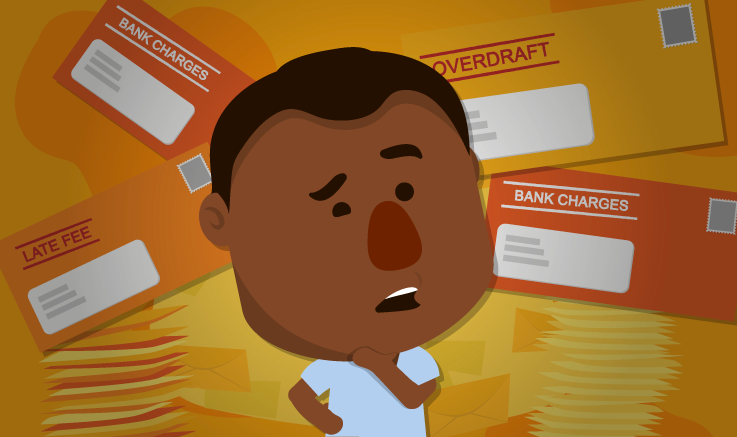
We understand that at this particular time, we may all be a little anxious about what the future holds. And while the world’s news is full of stories about the global coronavirus pandemic, we want to draw your attention to another piece of news that may affect some of you, so that you can make sure that you’re better prepared for some changes that will be coming in next week.
What’s happening?
At the beginning of the new financial year – 6th April – all major UK banks were planning to carry out the biggest change to overdrafts in a generation. Interest rates will be changing from a daily or weekly fee to a flat yearly fee. Some people may be better off for these changes, but for others the changes will make existing debt grow. If you have an overdraft on your bank account, read on to understand how this will work and what you can do…
Have you ever been confused by the way your bank charges you to have an overdraft? The way that banks structure overdraft fees and charge their customers for them, caught the attention of the Financial Conduct Authority [FCA]. The FCA is an organisation that makes sure that companies providing financial services, such as banks, stay fair to their customers.
To try and protect people from unfair fees, the FCA ordered banks to get rid of complex fee structures for overdrafts and replace them with one, ‘simple annual interest rate’ by April 2020 – this year!
Due to the current coronavirus situation, many banks are now changing their short-term plans and are putting a number of alternative measures in place. These include, suspending the planned rises, putting £300 buffer zones in overdrafts with 0% interest and allowing you to apply for new 0% overdrafts.
Each bank is making different decisions on this, so to find out what your bank is planning, just click here.
What’s an interest rate?
The interest rate on an overdraft is the amount of money that you are charged for having an overdraft. The amount charged is a percentage of the amount of money you are overdrawn. At the moment, most overdrafts have an interest rate of 12-14%, but come the 6th April (or later this year), your rate might be raised to almost 40%!
Which banks are planning to increase their overdraft fee?
The banks that have planned to adopt this rise in fee include:
- Bank of Scotland
- TSB Bank
- Barclays
- M&S Bank
- Nationwide
- Natwest
- Lloyds
- Santander
- First Direct
- RBS
There may be more, smaller banks that will also be raising their fee, so make sure you check with your bank on the changes they will be making.
What does this mean for people?
It’s not all bad news! The FCA (Financial Conduct Authority) ordered these changes to try and protect people from a variety of fees on overdrafts. It’s actually estimated that 7 out of 10 people who use their arranged or unarranged overdraft as a ‘buffer’ for their monthly budget and so are not consistently in their overdraft, will either save money or see no change in what they are charged.
Banks also cannot now charge higher fees on unarranged or arranged overdrafts, so you won’t be getting any nasty surprises at the end of the month!
Those who live constantly ‘in the red’ however, might find that they end up being charged twice as much under the new charges.
For example, imagine you’ve set up a £1,000 overdraft limit with your bank, with an interest rate of around 16% – 20%. Many of the big banks are raising that figure to around 40%. So, if you’re sitting right at the maxed-out end of that £1,000 arranged overdraft, the annual interest that you would pay, could jump from around £180 to almost £400.
What can you do?
- Speak to your bank
These changes have been in the pipeline for a while, so if you’re worried about how these changes will affect you, speak to your bank to get further details – they will be able to explain what these changes mean for you personally
- Switch Current Accounts to a 0% overdraft
Even with an active overdraft you are allowed to switch current accounts. Some accounts like Nationwide’s FlexDirect allow you to pay no interest on overdrafts over 12 months. After that time the interest rate will go back 39.9%, so use that first interest-free year to pay off the overdraft at no extra cost!
- Talk to your local credit union
They may be able to bring you over to an account at a lower interest rate, with no fees. We talk about why credit unions can be a great alternative to mainstream banks here.
If you want to compare the rates between what different accounts are planning, Moneyfacts.co.uk have created tables where you can find out the differences in new overdraft fees between most of the mainstream bank accounts. Click here and scroll down to have a look for yourself.
This information was correct at time of publishing on 6th April 2020. Please contact your bank for information specific to your account.
The HomeSwapper Customer Support team are always on hand to give advice and tips on how to get the most from HomeSwapper. They deal with Swappers every day and have a unique insight and view on the thousands of successful swaps that take place on HomeSwapper.






